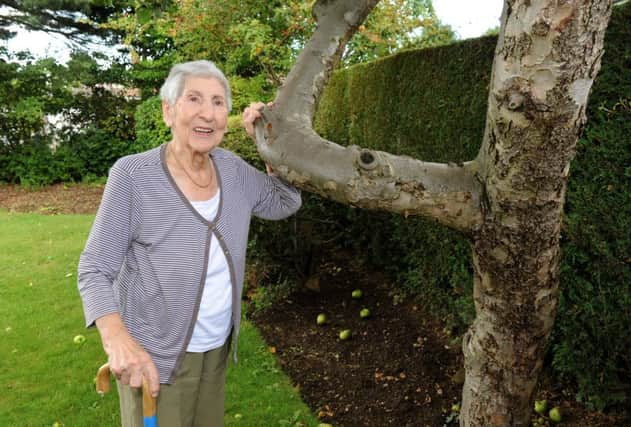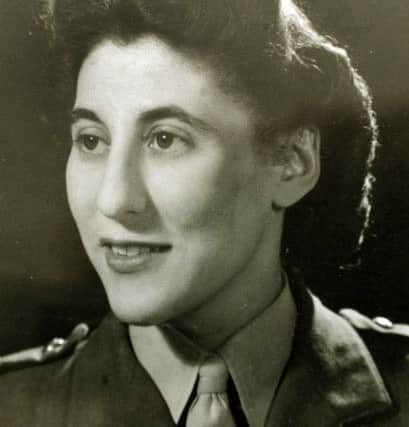The Leeds couple and a walk through history


THERE is nothing in their comfortable bungalow in a leafy suburb of north Leeds to suggest that Min and Jack Marks are different from most other elderly couples.
Min is 94 and Jack, her husband, is a year older. They have a little pond outside and a small, well tended garden. The only thing that hints that they might not be your average nonagenarians is a copy of the Morning Star lying on a coffee table.
Advertisement
Hide AdAdvertisement
Hide AdThe pair have lived in Leeds for most of their lives spanning much of the 20th century, and their collective memories are a living, breathing treasure trove of a past that in a few years time will have slipped into history.


Both come from Jewish families and were born in Leeds during the years of upheaval following the First World War. Min’s family settled in the city after arriving from what is now Latvia, while Jack’s relatives fled here to escape persecution in Russia.
Jack was one of four brothers and sisters who lived with their parents in a “nice little house” on the outskirts of the city. “We lived on a street of terraced houses. In the middle was what was affectionately called ‘the midden’ [an open air dungheap] that was emptied once a week.”
His father was a “journeyman” who visited surrounding pit villages where he picked up orders for suits. “He was also a musician and he played the violin. When I was a young boy he would play the violin to send me to sleep. I can still remember some of the melodies he played, it was wonderful.”
Advertisement
Hide AdAdvertisement
Hide AdMin’s family lived in the city centre before moving to Chapeltown which, back in the 1920s and 30s, was a prosperous suburb. Her grandfather, Wolf Israel, was a prominent wool merchant and her father, Isaac, later took over the family business.
She remembers going with her father to visit the mills in Leeds when she was a little girl. “Because of my grandfather’s reputation as an honest man my father was accepted by them, because the mills were closed shops. The mill owners were lovely and sometimes they would give me half a crown.”
Prior to this her father had served in a Jewish brigade that was part of the Royal Fusiliers and saw action during the First World War, and on his return he became a naturalized British citizen in recognition of the service he had given to his adopted country.
Min says her childhood was a happy one. “We were a fairly orthodox Jewish household. Jack says we were posh but we weren’t. But we had a fairly good life and we were never short of anything to eat.”
Advertisement
Hide AdAdvertisement
Hide AdShe remembers the city in the days when you were as likely to see a horse and cart as you were a car – a far cry from today’s bustling metropolis.
“Back then Chapel Allerton was still a village whereas now it’s part of the city. We would walk to Potternewton Park or Roundhay Park and if we were lucky we would have a bottle of lemonade, and if we were unlucky we had a bottle of water.”
She went to Chapel Allerton High School where a certain Fanny Waterman, of Leeds International Piano Competition fame, was also a pupil. “She was a year older than me but I remember she used to play the piano during hymns in assembly.”
Min had to leave school at 16 to help look after her sick mother and then her father when he fell ill.
Advertisement
Hide AdAdvertisement
Hide AdJack also left school at a similar age, but he went to work for Montague Burton’s menswear empire on Hudson Road in Harehills, which at one time was the biggest clothing factory in the world.
He worked in the cutting room as a trimmer. “There were a thousand people working in the cutting room, it was an incredible sight.” It was while there that he that he joined the Young Communist Party. “Burton’s was a real hotbed of revolutionaries and that’s where I became politicised,” he says.
Although Min and Jack were acquainted with one another it wasn’t until 1941, with the Second World War raging, that the first shoots of romance started to blossom between them.
However, by this time Jack had been sent to India where he was serving with the Royal Army Medical Corps (RAMC), while Min, who had learnt Morse code during her time in the Girl Guides, was training for a job in a secret signals unit.
Advertisement
Hide AdAdvertisement
Hide AdOnce her training was complete she worked at several Y stations, secret listening stations, including one on Blubberhouses Moor, near Harrogate.
“It was our job to take down blocks of Morse code which were then sent to Bletchley Park. I had to sign the Official Secrets Act so I couldn’t tell anybody what I was doing, not even Jack,” she says.
“We were listening to any German station that used Morse code and were told to pick up anything that was unusual. You worked for six days doing seven hour shifts, sometimes working through the night.”
Although they didn’t know exactly what the messages contained they were under no illusions about their importance. “One of the girls was told that if they talked about the work they were doing they could be hanged. That was the code we worked to.”
Advertisement
Hide AdAdvertisement
Hide AdAfter the war she and Jack were reunited and married in 1946. They returned to Leeds and started a family, raising three children.
Jack, who had his own podiatrist practice in Leeds city centre for 40 years, continued his political activism and organised several big marches and demonstrations.
Min, too, supported peace demonstrations and women’s rights protests. “There was a big peace movement in Leeds, it was a very forward thinking city in this respect.”
She was even persuaded to join the Communist Party, although only for a short time. “I wasn’t really a very good member,” she says.
Advertisement
Hide AdAdvertisement
Hide AdHowever, Jack remains a member of the Communist Party to this day. “We’re seeing more and more austerity and people don’t want it, but they aren’t being offered anything else.
“There’s no working class now, people call themselves middle class instead. Nobody mentions socialism any more apart from Jeremy Corbyn.”
Throughout their long lives they have remained steadfast in their political outlook, no matter unfashionable it might be.
Now, though, their days of political activism are behind them and instead they enjoy spending time with their extended family – as well as three children they have five grandchildren and six great-grandchildren.
Advertisement
Hide AdAdvertisement
Hide Ad“We have both led very full and creative lives,” says Min. “We have three wonderful children who love us and love each other, and I think that’s the mark of a good parent.”
As I’m leaving she thanks me for coming to see them before saying: “Don’t make us sound too outlandish, will you? We’re just ordinary people really.”
Perhaps they are – but only in the very best sense of the word.